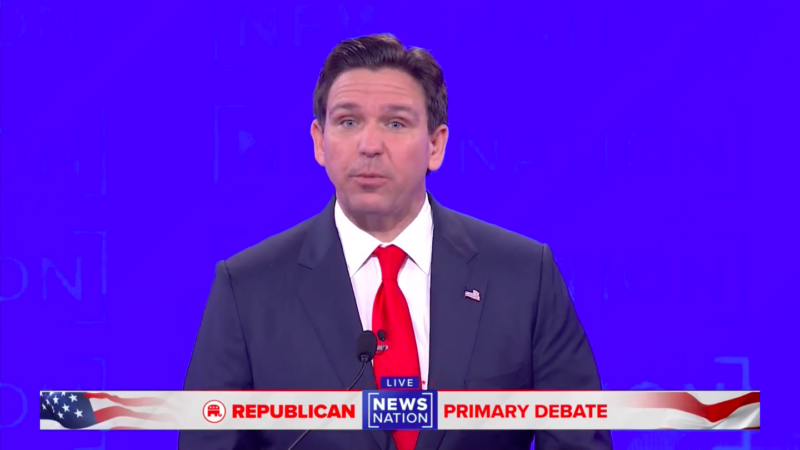DeSantis Gets Sex Trafficking Wrong at GOP Debate
"We're going to build a wall...I am not going to sit there and let sex trafficking go unabated," DeSantis said.

At tonight's GOP debate, Florida Gov. Ron DeSantis offered up a Trumpesque word salad of border boogeymen, promising to build a wall along the United States' southern border to help stop fentanyl trafficking, human trafficking, and sex trafficking. Once again, we have a politician conflating very separate issues and spouting myths about their origins in order to score cheap debate-stage points.
"We're going to build a wall," said DeSantis. "I am not going to sit there and allow mothers to lose more kids because of fentanyl overdose. I am not going to sit there and let sex trafficking go unabated, or human trafficking go unabated. There's going to be a new sheriff in town, and these drug cartels battle buckle up."
As we've pointed out again and again here at Reason, fentanyl primarily enters the country via U.S. citizens smuggling it in through legal points of entry, not via foreign nationals illegally crossing the southern border.
As for "sex trafficking" and "human trafficking," those are terms that under U.S. law do not actually require the crossing of borders at all. Illegally bringing people across the border is known as human smuggling. Human trafficking is an umbrella term that refers to forcing or coercing people into labor (labor trafficking) or commercial sexual activity (sex trafficking).
A massive mythology has been built up around these terms, especially sex trafficking. In pop culture and on social media, the phrase conjures images of shady international cabals, forceful abductions, captivity, confinement, and people sneaking women and children in or out of the country.
In reality, most major "sex trafficking busts" that make headlines simply target adult sex workers who are in the country legally and not being forced into anything.
And most victims of forced, coerced, and/or underage prostitution in the U.S. look nothing like the Hollywood or Washington narrative. They're not being secretly ferreted across the borders by Mexican cartels, or arriving in shipping containers from somewhere far away. They're likely to know their perpetrator, and to be kept in more of a metaphorical bondage than a physical one. Maybe they feel a romantic attachment to their "trafficker." Maybe it's a family member. Maybe they're bonded by addiction, or paralyzed by threats to report them to authorities (maybe for their undocumented status, or for engaging drug use or prostitution), or an abuser threatens to get their kids taken away, or something like that.
What you just don't see in U.S. sex trafficking cases is people being kidnapped in mall parking lots after being distracted by candy bar wrappers (as one weirdly prevalent social media myth goes) or being smuggled en masses across the southern border, a la the paranoid rantings of Ron DeSantis.


Show Comments (22)